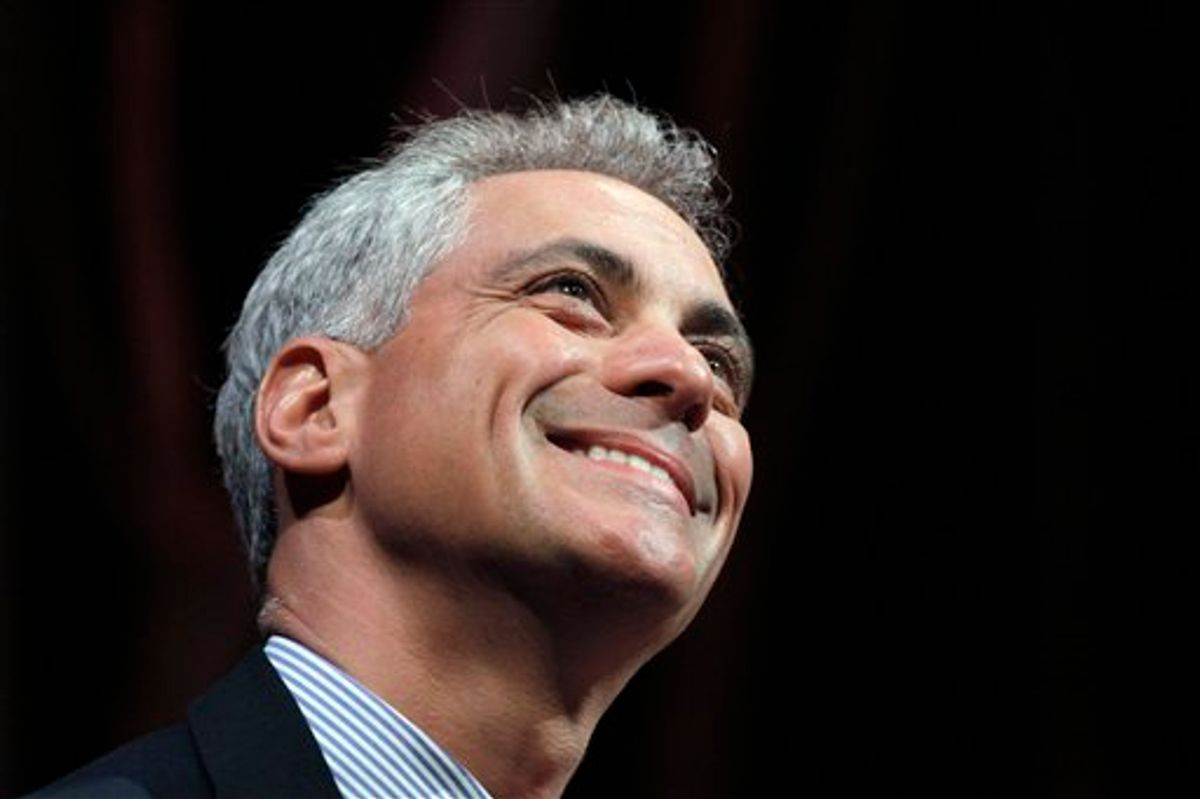Former White House chief of staff Rahm Emanuel was sworn in Monday as Chicago's first new mayor in two decades, a historic power shift in a city where the retiring Richard M. Daley was the only mayor a whole generation of Chicagoans have ever known.
Emanuel was sworn in during a morning inauguration ceremony at the popular downtown Millennium Park, one of the signature accomplishments in Daley's efforts to transform the city. Emanuel later planned to head over to City Hall and, for the first time since he was elected in February, walk into the fifth-floor office that was Daley's lair for 22 years.
"We must face the truth," Emanuel said in his inaugural speech. "It is time to take on the challenges that threaten the very future of our city: the quality of our schools, the safety of our streets, the cost and effectiveness of city government, and the urgent need to create the jobs of the future right here in Chicago."
"The decisions we make in the next two or three years will determine what Chicago will look like in the next 20 or 30."
Emanuel's swearing-in completes an interesting role swap between City Hall and the White House: Emanuel's replacement as Obama's chief of staff is the outgoing mayor's younger brother, William Daley.
In a mark of Emanuel's continuing ties with Washington, Vice President Joe Biden was in attendance at the inauguration, as was William Daley, Secretary of the Treasury Timothy Geitner and two other cabinet secretaries. Also scheduled to be there were the ambassadors of Mexico and six other countries.
Emanuel inherits a city with big money problems. Not only has Emanuel's transition team predicted a $700 million budget shortfall next year, but because of some controversial decisions by Daley -- most notably the push to privatize parking meters -- he has limited avenues to fund efforts to improve schools and repair the city's aging infrastructure.
It's a challenge Emanuel has not shied away from.
Emanuel, who represented Chicago in Congress before he went to Washington to become Obama's senior aide, made his desire to be mayor known more than a year ago during an interview on Charlie Rose's PBS talk show, saying "it's no secret" that he wanted to run for mayor if Daley didn't seek re-election.
When Daley announced last fall that he wouldn't seek a seventh term after 22 years in office -- longer than any other mayor in the city's history -- some wondered if Emanuel had some prior knowledge when he made that comment.
But if he did, that didn't stop him -- just days before Daley's stunning announcement -- from renewing his lease with the tenant who rented his Chicago home while the Emanuels lived in Washington.
That decision to rent his house was at the center of the biggest challenge standing between Emanuel and the mayor's office: the legal battle over whether he was a resident of Chicago and eligible to run for mayor.
That fight ended with an Illinois Supreme Court ruling in his favor -- but not before an appellate court panel decided that Emanuel's time away from the city made him ineligible to run and knocked his name off the ballot.
With that out of the way, Emanuel simply steamrolled over his opponents. Branded as a Washington outsider by other candidates including former Sen. Carol Moseley Braun and former Chicago schools president Gery Chico, Emanuel didn't miss an opportunity to remind voters that, unlike his opponents, he had friends in high places, even as he sought to convince them that he was one of them.
There was the campaign stop by former President Bill Clinton and the visit to Chicago by the Chinese President Hu Jintao -- a visit, Emanuel reminded reporters, that included a private meeting between the two.
Armed with a $14 million campaign war chest that dwarfed those of his opponents, the only question in the last weeks of the race was whether Emanuel would get 50 percent of the votes plus one vote to avoid a runoff.
Emanuel, who kept his temper and his legendary profane vocabulary under wraps during the campaign, ended up collecting 55 percent of the vote. In his last election campaigns, Daley was accustomed to collecting more than 70 percent.
Once elected, Emanuel wasted little time putting his administration together, bringing with him a number of people from his days in Washington.
For key posts, he went far outside the city. He hired the schools chief in Rochester, N.Y., to run the city's massive school system. He went to Newark, N.J., to find his police superintendent, choosing the head of that department rather than promote someone already in the department. And where Daley hired a local newspaper reporter as his press secretary, Emanuel hired his away from the U.S. Department of Agriculture in Washington.
In his speech, Emanuel thanked Daley for his service to the city, noting how the "world class" park where he was speaking had once been an abandoned rail yard and "nagging urban eyesore."
"A generation ago, people were writing Chicago off as a dying city," the new mayor said. "They said our downtown was failing, our neighborhoods were unlivable, our schools were the worst in the nation, and our politics had become so divisive we were referred to as Beirut on the Lake.
"When Richard M. Daley took office as mayor 22 years ago, he challenged all of us to lower our voices and raise our sights. Chicago is a different city today than the one Mayor Daley inherited, thanks to all he did."



Shares